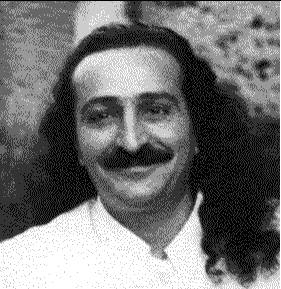Meher Baba
Meherwan Sheriar Irani (Meher Baba) was born in Pune, India in February 1894.
His parents were of Persian origin. He was first educated in Dastur Girls' School and later in St. Vincent High School, from where he was matriculated. In 1913, while in his first year at Deccan College he came in contact with Hazrat Babajan, one of the five Perfect Masters of the Age, who by a kiss on his forehead awakened him to the experience of what one may call God-realization.
During the course of subsequent seven years Upasani Maharaj, another Perfect Master of the age gave him knowledge of his infinite state and integrated his God-consciousness with the consciousness of the gross world, preparing him thus for his role.
He was reported to have met the other three perfect Masters of the time before he came in contact with Upasani Maharaj, but no record of what happened in such meeting is available, except that Sai Baba of Shirdi uttered "Parvardigar" on seeing him.


